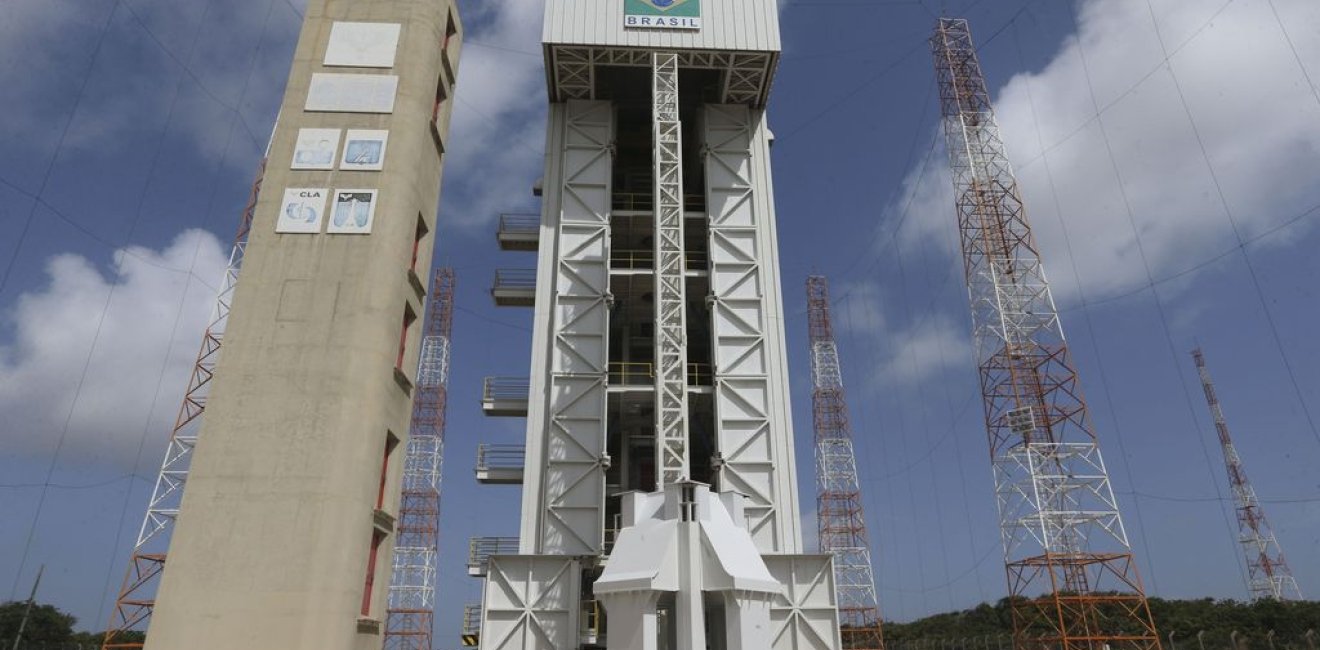
A blog of the Brazil Institute
Update: Brazil's Senate approved the Technological Safeguards Agreement (TSA) on Tuesday, November 12. The President of the Senate, Davi Alcolumbre, ratified the treaty on November 19, 2019.
President Jair Bolsonaro’s visit to the United States in March 2019 was openly celebrated by both governments, as well as policymakers and analysts, as a successful and constructive state visit, marked by a high degree of geopolitical symbolism. In addition to Brazil’s designation as a major non-NATO ally and President Trump’s backing of Brazil’s accession to the OECD—now waiting in line behind Argentina and Romania—the signing of a Technological Safeguards Agreement (TSA) marked a concrete step forward in the bilateral relationship. The treaty, approved by the Brazilian Lower House on October 22, 2019 and now awaiting a vote in the Brazilian Senate, allows for the launch of rockets containing U.S. technology from the Alcântara Launch Center (CLA) in Maranhão state, opening the door for the commercial use of the center and potentially for closer space cooperation between both countries.
The Potential Significance of the TSA
The United States requires other countries and companies to secure its authorization to launch satellites containing U.S. technology, in order to protect sensitive technologies from unauthorized copies or from being used for purposes at odds with U.S. strategic interests. This approval is often granted through bilateral safeguards agreements. As U.S. companies dominate the aerospace sector globally, and a majority of space equipment has U.S. parts (80 percent according to the Brazilian Science and Technology Ministry), Brazil has struggled over the past three decades to turn the Alcântara Launch Center into a successful commercial space launch hub without a TSA in place.
Brazil’s Minister of Science and Technology, Marcos Pontes, has argued the TSA is critical to overcome the country’s space challenges by attracting investments and generating revenue. Indeed, Brazil faces significant obstacles to advancing its space activities. Brazil never achieved its long-asserted objective of manufacturing a satellite launch vehicle, and the CLA, built during the 1980s, remains underused—in part due to the longstanding restrictions on using U.S. technology at the site. The current TSA agreement promises to improve the launch center and generate revenue from the taxes paid by aerospace companies to launch their satellites from Brazil’s territory.
Generating income is especially relevant, considering the country’s deep fiscal crisis and the Brazilian Space Agency’s (AEB) small budget, compared to other countries. In 2015, the AEB’s budget was just $70 million, while the Indian space agency received $1.16 billion; the Japanese space agency received $3.7 billion; and NASA received a whopping $17.4 billion. Since 2015, the AEB has suffered even more budget cuts: in 2019, the approved budget was approximately $45 million (R$ 180 million).
The TSA’s Complicated Political History
Yet despite its importance to the Brazilian space program, the ratification of the TSA is not guaranteed: it depends on congressional approval in the United States and in Brazil against the backdrop of a challenging political environment in both countries.
The current bilateral treaty is an updated version of a 2000 TSA that stalled in the Brazilian Congress after becoming the center of a dispute between the center-right government and center-left opposition. While the government argued that the treaty was crucial since Brazil lacked the financial and material resources to conduct launches independently, critics argued that it was asymmetric and infringed on Brazil’s sovereignty, since it created more obligations for Brazil than for the United States, and did not allow Brazil to supervise U.S. activities.
Sovereignty concerns raised by left-leaning parties focused on four items in the 2000 TSA: i) the creation of restricted areas in the spaceport, where only U.S.-approved staff would have access; ii) the prohibition of customs inspections of U.S. space equipment and supplies headed to Alcântara; iii) the prohibition of launches conducted by countries outside the Missile Technology Control Regime (MTCR) or that sponsored international terrorism; and iv) the prohibition of using the resources obtained from the commercial use of the CLA to produce or acquire rocket systems. In 2001, the Brazilian Congress recommended changes to the treaty’s text, but there was no public attempt to renegotiate it until 2016.
Some of the concerns raised in 2001 were incorporated into the 2019 agreement, which was written in a more reciprocal fashion. For example, restricted areas were defined as regions where access is controlled by both parties to guarantee the entry of only U.S.-authorized staff, and the treaty allows Brazil to exercise veto controls on who is designated a U.S. participant. It also authorizes U.S. personnel to inform Brazil about radioactive material and any substances that could harm the population or the environment and requires the United States to declare what is being transported to Alcântara. Lastly, it allows Brazilian authorities to be present when U.S. personnel offload and open shipments containing equipment and supplies, for the purpose of inspection. Countries that sponsor terrorism remain prohibited from using the CLA, but the treaty enables consulting processes regarding the definition of the term “terrorism.” The treaty forbids countries that are not part of the MTCR using the Brazilian launch site unless both parties (Brazil and the United States) agree to an exception. More importantly, it explicitly allows the revenue from launches to be used for the Brazilian space program, except in the development or acquisition of rocket systems incompatible with the MTCR Annex, Category I—rocket systems capable of delivering 500 kg to a range of 300 km. As a result of these modifications, the Brazilian government claims the 2019 TSA solves the previous sovereignty-related concerns: Brazil will retain access to the entirety of the Alcântara launch center and will monitor all operations.
These changes and the more favorable political context in Brazil, where the center and far-right parties now hold the majority in Congress, seem to have done the trick: Brazil’s lower house, the Federal Chamber of Deputies, passed the treaty on October 22, 2019 with a vote of 329 in favor and just 86 against. The text is now before the Senate, and approval seems likely.
Nonetheless, there has been pushback from Quilombola rights organizations who argue Alcântara’s expansion threatens Quilombola land tenure and will lead to the displacement of traditional communities surrounding the base. This issue has received some attention in Washington as well—where the U.S. Congress (including the Democratic-led Lower House) has yet to vote on the treaty.
The Future of the Alcântara Launch Center
If the TSA is fully ratified, however, the question of its real impact on the CLA and the Brazilian space program more generally remains. Brazilian authorities believe the Alcântara Launch Center will be competitive because of its location near the equator, which allows for fuel savings as it is easier to achieve the necessary velocity to launch satellites into orbit. Echoing this narrative, President Trump stated in May that it is an ‘ideal launch location’ for U.S. companies. According to Minister Marcos Pontes, the treaty will bring approximately $3.5 billion to Brazil, uplifting its aerospace sector and generating development in Maranhão state.
However, this estimate is difficult to verify, as there are no studies predicting such an amount and the government’s discourse ignores several factors: although the CLA has a competitive advantage thanks to its proximity to the equator, it has a competitor nearby: the successful space center in French Guiana, used by several European companies. Furthermore, the biggest U.S. companies have not shown interest in the CLA thus far and there are doubts about the amount of money they would be willing to invest to make the spaceport adequate for their operations. Companies would need to consider transportation costs, for example, and they can already operate from Florida, limiting the gains and attractiveness of launching near the equator. On the other hand, microsatellite companies have shown more interest, since they would not require as many investments to conduct their operations. Promised overall improvement in the business climate by Bolsonaro’s economic team and the implementation of a series of economic reforms aimed at improving the business climate and reducing bureaucracy should help make the sector more attractive to foreign investors.
Moreover, although significant, the TSA is not sufficient to resolve the larger challenges facing the Brazilian space program. There is no guarantee that the revenue will be reinvested in space technology, and Brazil has for years underinvested in basic science and technology development. Instead, Brazil sought to advance the Brazilian space program through a few highly ambitious but ultimately unsuccessful projects and partnerships—including its failed effort to develop a national space vehicle capable of putting satellites into orbit. The space program’s primary achievements have been smaller: four successful launches of Earth-observation satellites built in partnership with China, the development of suborbital sounding rockets in partnership with Germany, and a geostationary satellite built in partnership with the Italian company Thales—launched not from Alcântara but from its competitor in French Guiana in 2017—to deliver internet services to remote areas in Brazil and provide the Armed Forces with a national line of communication.
In this regard, the TSA represents a significant step forward for the Brazilian space program and will most likely bring needed financial resources to the country. Considering the grave fiscal crisis Brazil is experiencing, it is crucial that space activities generate income, not only demand investments. However, the treaty alone will not solve all Brazilian space challenges, especially when it comes to advancements in satellite launching technology and advanced scientific expertise more generally. If Brazil wants to be a relevant player in space, it needs to ensure that future revenues are invested in promoting innovation and advancements for its own space program, including training astronauts and scientists, and investing in the development of new and existing space technologies.
Image by Valter Campanato via Agência Brasil
Author


Brazil Institute
The Brazil Institute—the only country-specific policy institution focused on Brazil in Washington—aims to deepen understanding of Brazil’s complex landscape and strengthen relations between Brazilian and US institutions across all sectors. Read more

Explore More in Brazil Builds
Browse Brazil Builds
They're Still Here: Brazil's unfinished reckoning with military impunity



